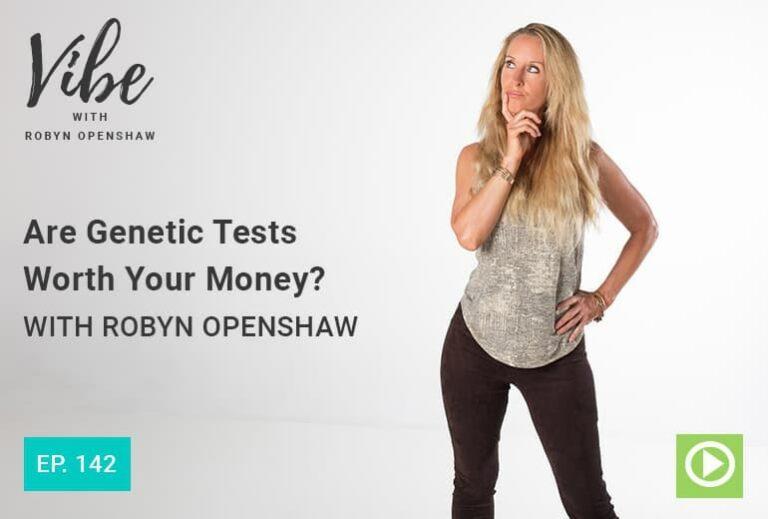Ep. 142: Are Genetic Tests Worth Your Money? with Robyn Openshaw

Podcast: Play in new window
Are genetic tests worth your money? Today we’re taking another dive into genetic testing. These tests, like 23andMe, are all the rage; but what happens when that data is sold to pharmaceutical companies? Let’s discuss implications most don’t think about before they get the test, and some interesting Brave New World ethical conundrums that are arising from knowing the entire genetic code, for tens of millions of us.
____________________________________________________________________
EPISODE HIGHLIGHTS:
- [01:40] Other people use my genetic information? Big pharmaceutical company Glaxosmithkline partnered with 23andMe to create better drugs, which means they access and own your genetic code
- [02:53] Genetic crime stories, anyone? Crime and court cases are being impacted by our genetic material linking us to locations we’ve been. Sometimes it’s good! Other times, perhaps not.
- [06:43] Your cost, doubled. While on the surface there’s nothing wrong with using DNA to develop medicines, what about ethical problems that arise when this medicine is then sold back to the public at exorbitant rates?
- [09:53] Your (complicated) family tree. Genetic testing helps find long-lost family members, and family members who would rather stay hidden. What are the ethics behind unwilling participants and their privacy?
- [11:32] Our society misrepresented. If the pharmaceutical companies only use data gleaned from people who can afford the test, underprivileged neighborhoods will be left out of the genetic equation. This reinforces the issue of who’s going to get the benefits of mapping the genome.
- [12:24] Pros and Cons in ABC. There are many points on both sides of the genetic aisle, but does one side justify the other? Relief, knowledge, and opportunity compared to anxiety, non-elimination, quality of results, and over-diagnosis.
[Related podcast: Ep. 144: How Much Attention Should We Give Our Genetics? with Dr. Ben Lynch]
____________________________________________________________________
TRANSCRIPT:
This transcript has been edited for clarity.
Robyn: Hey everyone, it’s Robyn Openshaw and welcome back to the Vibe show. This is episode five in a series that I’m doing about how to smell a rat in the health and wellness industry.
The last one we did, I talked in probably more detail than you even wanted to hear about my thoughts on the microbiome tests, and the fact that we don’t have enough information about the microbiome to make the inferences that these companies, like uBiome that just got raided by the FBI; Viome, which has raised $45 million of investor money; and one called 2ndDay (you can think about why a poop test would be called 2ndDay, ’nuff said), and a couple of others that have popped up in the last seven years. Why they are making inferences I don’t believe they have earned when you look at what very little evidence there is about what you can even do with that kind of information.
So today, nice short episode. I want to share with you a few of my thoughts about the genetic tests.
Genetic Tests
They’re all the rage. Everybody wants to talk about what they learned from their 23andMe (it’s probably the biggest one out there), but what are the privacy implications? What are the ethical implications? What do you need to know before you give your genetic material to one of these companies like 23andMe.
On July 25th of 2018, 23andMe announced that it is partnering with Glaxosmithkline and it will allow that huge pharmaceutical company to use the test results from 23andMe from 5 million customers so far. They’re using it to design new drugs now. That’s what they say they’re doing, to design new drugs, and that sounds like a good thing, right? They’re going to take your genetic information and hopefully come up with new, better drugs or maybe just new billion-dollar money makers for them.
Glaxosmithkline has invested $300 million in 23andMe. So, it sounds to me more like a takeover, more like buying 23andMe. I’m sure that ongoing, with this kind of partnership, if you give your genetic material to this company, they will own your genetic code. Big news, because it’s going to give rise to an industry, that will no doubt come from it, that people are calling genetic surveillance.
Some of the companies besides 23andMe are ancestry DNA, myheritage.com, Living DNA, and HomeDNA. You can get online and poke around and learn about how crime cases and court cases are being impacted by the fact that our genetic material can link us to a place that we showed up in.
They just caught the Golden State Killer. This dude is in his seventies now and thanks to DNA evidence — I mean this guy was one of the most prolific serial killers in American history — they literally went up to his door, and they had the whole house surrounded by law enforcement with guns at the ready, and knocked on his door. He answered the door and he said, “Hold on, I’ve got a roast in the oven. Can I turn it off?” This guy was a former cop and he killed at least 12 women in Sacramento. I think there’s a couple of men in there actually. In fact, I read a story about him, how there were so many rapes. He raped at least 50 women. The number is probably much higher.
Back in the 1970s there was a community meeting that was held because the whole community was terrified, as this guy was just on this rampage of rape and murder, and lots of people went to this community meeting and a man stood up and said at the community meeting that if the men would just try to stay home with their wives, if the wives were not left alone, that they would be safe. Only a couple of weeks later, the Golden State Killer struck again and killed both the man and his wife.
The Golden State Killer terrorized northern California in the 1970s and early 1980s. But even though that’s clearly a good thing, that they honed in on a notorious criminal, and there are lots of other stories like that, kind of exciting stories, you’re going to be seeing a lot more crime, podcasts and crime shows popping up about what is going on with DNA evidence, including that you can hone in on a killer.
There’s another case, I want to say it was in Ohio, where a little girl disappeared from her bedroom back in the 1980s and they tested decades later. They tested his DNA and were able to match it to a relative, I think it was a cousin. And they found the killer based on the similarity of his DNA to the cousin who had some uploaded DNA in one of these databases. That cousin was able to lead law enforcement to the guy who lived right in the neighborhood with the little girl who disappeared.
Things like this are happening more and more commonly now. And while that’s exciting, we should also consider that there’s an argument to be made that it violates people’s rights to privacy and security against unreasonable search and seizure, which is actually a constitutional right.
Genetic Tests: Crime
There is a story out there in the news about law enforcement forcing their way into a retirement home and terrifying a guy because based on a genetic test, he was accused. But guess what? He was innocent. Lots of times we might have our DNA, it could be a flake of skin, at a place where crime is later committed that could link us to a crime. Just because your DNA is there doesn’t mean you committed the crime, right?
It could lead to many more wrongful convictions. Even a rape kit isn’t foolproof. People who have had consensual sex with someone who is later a rape and or murder victim have been convicted of the crime. Even if they were innocent. You can look up the case of Rodney Reed that comes to mind.
There may be other ethical implications of big Pharma companies owning your genetic code. While on the surface there’s nothing wrong with using DNA to develop medicines, what about ethical problems that arise when this medicine is then sold back to the public at exorbitant rates? Because it’s based on information no one else has access to. You can bet that pharmaceutical companies can and will make any drugs that are useful to the public prohibitively expensive to increase their bottom line.
This means that 23andMe customers will in effect be charged twice for any potential innovative new medicines that their DNA helps produce the first time they paid for the DNA sequencing service. The second time they pay for the medicine that it helps create.
Here’s a quote from Time magazine. “If people are concerned about their social security numbers being stolen, they should be concerned about their genetic information being misused. This information is never 100% safe. The risk is magnified when one organization shares it with a second organization. When information moves from one place to another, there’s always a chance for it to be intercepted by unintended third parties.”
I’m not saying not to get your genetics tested. I think a lot of people are doing it as some kind of parlor game. They’re curious. They want to say that they found out that they thought that they were white, and they found out they had an African great-grandfather. They want to find out that they have a mystery half-sister that their mother never told them about before she passed away. There’s all kinds of stories like that that are increasing people’s curiosity about this.
As people are becoming more and more aware of privacy issues, criminals apparently are using their genetic data to upload it under a different name in these databases. How will they police this? And if they have false information like that, what will that do then to the accuracy of the data that they’re using to develop potentially new medical interventions?
I’m also concerned that these companies might try to scare you with what your genetic code says. I’m absolutely certain that they will use your genetic code to try to create supplements to sell you, and again, just like with the microbiome tests, I don’t think that’s warranted. Not with what we know about epigenetics these days. Your specific genetic code doesn’t necessarily lead to a nice, tidy list of supplements that will save you from any future health problems.
And that’s, of course, just a concern to add to the loss of privacy.
I will tell you that I have not done the genetic tests. The one thing I could think of that I might do genetic testing is if I had mother and grandmother who’d had ovarian cancer and breast cancer, or there was a concern for BRCA1 or BRCA2 in my family, I might have that done. We don’t have that, so I’m not getting my genetic testing done.
Genetic Tests: Privacy
Some interesting ethical implications are coming up. I have a friend on Facebook who is a lesbian, always has been. Now she’s in her, I want to say late fifties, and she had a daughter many years ago who’s now in her mid-twenties and that daughter was conceived by a sperm donor.
This man, who was the sperm donor and has a daughter walking around, now has a family of his own. In fact, he has several adult children now and he’s been married for a couple of decades, and he fathered this baby 25 years ago under the clear understanding that he would not be in that child’s life. He was just doing a lesbian lady a favor. But my friend’s daughter can, and is talking about going to, upload her genetic code into one of these databases so she can find her half-siblings. She doesn’t even know she has four half-siblings.
Here’s the thing: that man doesn’t want to be found. And he will be found without any participation on his part because he does have a biological child who has given her genetic material to 23andMe. And now my friend the lesbian, whose daughter was conceived with the sperm donor is talking about also doing 23andMe. So, my friend is biting her fingernails and totally panicked that this agreement she had from 25 years ago is about to completely collapse, due to no fault of her own.
Again, there are some privacy issues here.
Another minor concern brought up by one expert as I was studying this, said that if GlaxoSmithKline uses data from 23andMe customers, who are presumably people who can afford to pay at least $69 for a genetic test kit, it’s likely going to result in a skewed sample. It’s not going to be a nationally representative research sample, which could in turn limit the widespread relevance of its findings. Basically, you’re going to have a lot of middle- and upper-class people, and this expert said, “I don’t think you’re going to be able to have very big samples in there from poor neighborhoods, or Native American reservations for example. It kind of just reinforces the issue about who’s going to get the benefits of mapping the genome.”
Just to conclude this discussion of the pros and cons, here is what I found. One expert (this is not my material here), but one expert suggested that the pros of doing your genetic testing are A) a sense of relief from uncertainty, B) in-depth knowledge about your risks, C) information to help make informed medical and lifestyle decisions, D) opportunity to help educate other family members about potential risk, E) health insurance plans will often cover the cost of genetic testing when it’s recommended by your healthcare provider.
I want to say about all of those pros that whoever wrote that list assumes that we have good prescriptive recommendations for people based on their genetics. And I have already made the case, in great detail in my last episode, that we don’t have the ability to make scientifically grounded inferences from our genetic testing. I can think of very, very few exceptions to that.
In my opinion, the cons are significant. And the cons that someone else came up with are A) testing may increase anxiety and stress for some individuals, B) testing does not eliminate a person’s risk, C) results in some cases may return inconclusive or uncertain, D) it’s difficult to decide which course of action to take in view of the results, and E) potential over-diagnosis.
Just some things to think about. I hope this has gotten you thinking about implications that you might not have considered before if you’re considering getting genetic testing.
I don’t have all the answers, but I did want to do a little deep dive for you into some of the new testing that a lot of people are getting into. This is why I’m not doing either one of them. I’m not going to do the microbiome tests at this time. I’m not going to do the genetic testing at this time.
I hope it’s useful for you as you think through your own decisions, and I will see you next time.
[Related episode: Ep. 144: How Much Attention Should We Give Our Genetics? with Dr. Ben Lynch]















No comments found, but you can be our first!